|
|
|
Sort Order |
|
|
|
Items / Page
|
|
|
|
|
|
|
| Srl | Item |
| 1 |
ID:
158203
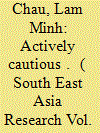

|
|
|
|
|
| Summary/Abstract |
This article uses the case of a northern Vietnamese village to explore how rural households in Asia have negotiated both the opportunities and challenges of marketization and capitalist industrial modernity. I focus on the Vietnamese state’s push to marketize village livelihoods by means of mass establishment of industrial parks comprising largely Foreign Direct Investment factories in the countryside. The state expects young villagers to abandon low-value agricultural livelihoods and treat factory work as their only livelihood strategy and the lifetime warranty of their well-being. Yet while young villagers have been responsive to new opportunities of industrial employment, they have all treated factory work in ways very different from what the state expects: merely as one of their household’s diverse portfolio of livelihood options. I argue that villagers have handled the encounter with industrial modernity in ways rarely documented in the literature on marketization in rural Asia: as ‘actively cautious’ decision-makers, who actively pursue industrial employment to improve their family’s living standards, and carefully maintain a portfolio of livelihood strategies to protect the family’s well-being from the many insecurities of the industrial workplace.
|
|
|
|
|
|
|
|
|
|
|
|
|
|
|
|
| 2 |
ID:
184117
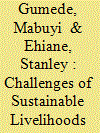

|
|
|
|
|
| Summary/Abstract |
This paper explores the extent to which land ownership through restoration results in non-sustainability in the Nonoti community in South Africa. During the apartheid era, Black communities were evicted from their ancestral land to make way for tourism development, though those lands were later repossessed by their original owners. This study aims at exploring the challenges of post-settlement after land restoration to new landowners in the Nonoti Beach resort. This paper is anchored on the sustainable livelihoods theoretical framework to measure the extent to which land can enhance socio-economic development. This study adopted a qualitative research design using in-depth interviews and focus groups. The sample of this study was drawn from the Nonoti local community members and representatives of the government agencies in charge of land restoration. The study concludes that landowners should be capacitated through training and skills development to live sustainably on the land they have acquired through the land claims process.
|
|
|
|
|
|
|
|
|
|
|
|
|
|
|
|
| 3 |
ID:
182943
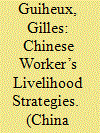

|
|
|
|
|
| Summary/Abstract |
This article evaluates the possibilities of individual agency in the case of a group of workers employed by a large garment factory in Zhejiang Province. The issue of workers’ ability to exercise power is tested by two sets of facts: workers’ job histories and workers’ household expenses. The author argues that workers’ agency is largely dependent upon gender, age, place of origin, and living arrangements. Workers’ main power is the possibility to quit a job. The overall conclusion is that agency remains limited by the precariousness of workers’ lives from a lifelong perspective.
|
|
|
|
|
|
|
|
|
|
|
|
|
|
|
|
| 4 |
ID:
123502
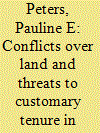

|
|
|
|
|
| Publication |
2013.
|
| Summary/Abstract |
The currently intense debate about 'land grabs' or 'land investment' in Africa has reinforced the significance of relations around land on the continent. This article argues that holders of land under customary tenure face increasing threat and that the role of foreign investors must not obscure the centrality of national agents - governments, political authorities and private actors - in land deals. The article first outlines the historical heritage of the colonial construction and post-colonial reproduction of customary tenure and its denial of full property to customary land-holders. The second part considers the escalating competition and conflict centered on land; the increase in land transfers implicated in the pervasive social conflict focused on land; and the associated rise in social inequality and contestation over belonging and citizenship. All these processes intensify the vulnerability of customarily held land in face of an escalation in efforts to acquire landed resources. The third and final part discusses 'land grabs', the most recent surge of international interest in African land, and the equally significant appropriation of land by national agents. The article concludes that the land question in contemporary Africa has to be linked to the dynamics of social transformation and inequality at multiple levels - global, regional, national, sub-national - that are reshaping not merely access to landed resources but the very bases of authority, livelihood, ownership and citizenship.
|
|
|
|
|
|
|
|
|
|
|
|
|
|
|
|
| 5 |
ID:
180688


|
|
|
|
|
| Summary/Abstract |
The paper aims to analyze poverty issues in rural households of India sampled purposively from the perspective of per capita Monthly Consumption Expenditure. In addition, the decomposition of poverty across social group affiliation and economic status adds another flavor to this study. The study concentrates on one of the backward areas of West Bengal, the district of Purulia, a resource-poor district with a distinct presence of scheduled social group population. The candidate villages were selected purposively keeping in mind the aspects of physical isolation and socio-economic stagnancy. Quantitative tools like Stepwise Multiple Regression and Decomposition analysis by FGT indices were instrumental in estimating the relative strengths of the factors affecting poverty. Besides, the study has simultaneously added the life history approach to integrate the QUAN-QUAL methods with an aim to produce a more complete picture. The critical findings include that the scheduled social groups, especially tribes, and daily wage casual laborers followed by agricultural laborers, were identified as the most vulnerable to poverty indicators in their respective population segments.
|
|
|
|
|
|
|
|
|
|
|
|
|
|
|
|
| 6 |
ID:
173391
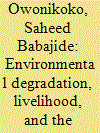

|
|
|
|
|
| Summary/Abstract |
The socio-economic conditions of the inhabitants of Lake Chad Region (LCR) in the instability of the region has been well researched. But there has been relatively little work on how environmental conditions contribute to the expanding instability of the region. Using data collected from both primary and secondary sources, this study shows how the shrinking Lake Chad contributes to the instability of the LCR. The study finds out that in the last six decades, climate change, over-exploitation and demographic pressure have contributed to the shrinking of the waterbody by over 90% leading to inability to sustain livelihoods of inhabitants. Loss of livelihoods has promoted criminality, easy recruitment by terrorist groups, migration to urban centres in search of better means of livelihood. This has also led to violent clashes and crimes in cities and towns. Furthermore, management of the shrinking lake has caused conflicts among the riparian states and this has greatly inhibited their ability to collective fight insecurity in the region. The study concludes that in enhancing the stability of the Lake Chad Region, addressing the shrinking Lake Chad must be given priority by the riparian states and other concerned stakeholders.
|
|
|
|
|
|
|
|
|
|
|
|
|
|
|
|
| 7 |
ID:
099616
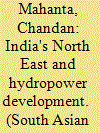

|
|
|
|
|
| Publication |
2010.
|
| Summary/Abstract |
Hydropower, while being projected as a clean and renewable energy source, has time and again been resisted vociferously in North East India in recent times because of the obvious and unintended social and environmental impacts. The anticipated negative impacts of the associated dam and reservoir construction have cast a threat to the security of the indigenous people in terms of water, food, livelihood, energy and above all, the related socio-economic concerns. This is all the more due to the uncertainties flowing from an inadequate understanding of the possible geo-environmental impacts in a highly sensitive terrain. To cope and live with the potential negative ramifications of hydropower projects, a comprehensive hydropower policy with emphasis on long-term environmental and social security and sustainability is imperative.
|
|
|
|
|
|
|
|
|
|
|
|
|
|
|
|
| 8 |
ID:
163746


|
|
|
|
|
| Summary/Abstract |
Intra- and inter-regional migration is widely described. Prior studies have attribute varied reasons for this development including the quest for greener pastures and unequal development in northern Ghana. What has escaped critical scrutiny is some migrants’ ability to escape extreme rural poverty, albeit in harsh urban environment. Such a missing gap can potentiate high policy failures, hence the need for academic attention. Using a mixed method, we focus on two informal daily livelihoods as exemplars – exceptionalism – in Accra. We see their embedded organisational vitality and dynamic networks as illuminating for good livelihood practices, proper city governance and fostering economic empowerment. We call on city authorities to take cognisance of such complexities and heterogeneity of production–labour relations, failure of which can spell doom for policies ostensibly initiated to curb migration, as they are likely to be underpinned by factual inaccuracies and may result in ill-fated interventions.
|
|
|
|
|
|
|
|
|
|
|
|
|
|
|
|
| 9 |
ID:
085799


|
|
|
|
|
| Publication |
2008.
|
| Summary/Abstract |
The livelihood activities along the coastal areas differ from one coastal strech to another. Even these differ from inland livelihood in terms of pattern of activities. The coastal livelihood are also comparatively vulnerable than the inlands because of frequent changes in weather condition. As such it is very difficult to implement properly sustainable livelihood generation plans in the coastal area.
|
|
|
|
|
|
|
|
|
|
|
|
|
|
|
|
| 10 |
ID:
107776


|
|
|
|
|
| Publication |
New Delhi, Routledge, 2011.
|
| Description |
viii, 186p.
|
| Standard Number |
9780415612548, hbk
|
|
|
|
|
|
|
|
|
|
|
|
Copies: C:1/I:0,R:0,Q:0
Circulation
| Accession# | Call# | Current Location | Status | Policy | Location |
| 056249 | 303.623/GUP 056249 | Main | On Shelf | General | |
|
|
|
|
| 11 |
ID:
185115


|
|
|
|
|
| Summary/Abstract |
Anthropogenic climate change poses huge challenges to humanity. The frequency and magnitude of extreme weather is increasing. As more attention turns to disaster preparedness and recovery, it is worth recognising that many communities have a long history of living with the flux of planetary dynamism. They are experienced in negotiating collective well-being with one another and with the earth. Other communities have less experience and know-how and have had to adopt more experimental approaches. In this paper we draw on planetary social thought and critical disaster studies to re-think disaster recovery. We present stories of communities in the Philippines differently negotiating collective well-being in the face of climate uncertainty.
|
|
|
|
|
|
|
|
|
|
|
|
|
|
|
|
| 12 |
ID:
125204


|
|
|
|
|
| Publication |
2013.
|
| Summary/Abstract |
Vietnam's rural provinces are home to thousands of craft villages; communities engaged in small- and medium-scale manufacturing of a range of goods, from recycled paper products to processed food. Since the liberalization of the Vietnamese economy in 1986, craft villages have played a significant role in poverty reduction and livelihood diversification for rural households, and currently employ nearly one-third of Vietnam's rural labor force. However, the rapid expansion of craft manufacturing, combined with a lack of planning, has brought increased air, soil, and water pollution to craft villages and surrounding areas. Pollution levels are now so serious that they pose a major risk to local health and agriculture. This article examines why producers continue to expose themselves to environmental pollution and its associated health risks. Drawing on four case studies of craft villages in the Red River Delta region of northern Vietnam, the authors find that risk is a multidimensional phenomenon. Craft production typically involves a value chain of closely connected family economic units and takes place against a backdrop of fierce competition for market share both within Vietnam and elsewhere in Asia. In this context, the current policy of managing the environmental risks of pollution through regulation requires producers to take risks in other domains of equal or greater importance to them; their livelihoods and social relations. Craft producers make explicit trade-offs between the risks of ill health and the security that family and community ties provide in the face of uncertain production space, markets, and livelihoods. These findings highlight the importance of thinking
|
|
|
|
|
|
|
|
|
|
|
|
|
|
|
|
| 13 |
ID:
191856


|
|
|
|
|
| Summary/Abstract |
The destructive impacts of oil exploitation on the natural environment, which the inhabitants of the Niger Delta depend on for their livelihood, pose major threats to food security. Environmental damage alienates the local people from their ancestral lands and erodes their sources of livelihood. This study examines the effect of oil exploitation on the local people's access to sufficient, safe and culturally acceptable food. The study is based on data collected through interviews with key informants and Focus Group Discussions in the oil communities in Bayelsa, Delta and Rivers States. Environmental and livelihood sustainability are intricately interconnected. They have significant implications for food security of people in the oil-rich region. Nutritional adequacy is a necessary but not a sufficient condition for food security because cultural acceptability is also required. This study addresses the interplay between these factors and their implications for household food security in the Niger Delta.
|
|
|
|
|
|
|
|
|
|
|
|
|
|
|
|
| 14 |
ID:
162421
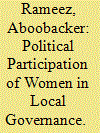

|
|
|
|
|
| Summary/Abstract |
Although Sri Lanka has 51% women, their participation in local governance as well as in the national parliament is 5% in total. The strong social development indicator of women in areas such as health and education has not translated into their increased political participation. As such, this study focuses on the level of women’s participation in local governance and explores why there is a low level of political participation of women in local governance. Both quantitative and qualitative methods comprising of questionnaire survey, interviews and focus group discussions were employed in this study. The findings show organized collective involvement of women was effective only in social welfare, livelihood and social security than political participation. The study also reveals that the low level of political participation by women is attributable to biological, economic, psychological, religious and political factors. Overall, it was found that although women are interested in participating in local governance, they have a lack of space for political participation.
|
|
|
|
|
|
|
|
|
|
|
|
|
|
|
|
| 15 |
ID:
083846


|
|
|
|
|
| Publication |
2008.
|
| Summary/Abstract |
Power has long been recognised as crucial to the sustainability of community development interventions; however, the way in which space affects power relations within such interventions has remained relatively under-theorised in the development literature. Many practitioners continue to regard power as located centrally and as embedded in particular institutions, networks, knowledge and resources. According to this logic, processes of empowerment involve the redistribution of these resources to marginalised groups through their participation in development interventions such as microfinance and sustainable livelihood initiatives. The danger inherent in such development approaches is that they can discourage the potential for participants to use their own agency by overemphasising an existing lack of resources locally and inadvertently feeding a sense of dependency on formal development interventions initiated by external agencies. This paper suggests that a post-structural conceptualisation of power as dynamic, multiple and mediated at the local level offers a more productive starting point for thinking about approaches to empowerment. Drawing on data from an action research project designed to initiate community enterprises in a small rural municipality in the Philippines, I suggest how a post-structural approach to power can be enacted by building on the existing local resources and practices of everyday life.
|
|
|
|
|
|
|
|
|
|
|
|
|
|
|
|
| 16 |
ID:
124757
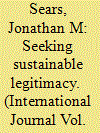

|
|
|
|
|
| Publication |
2013.
|
| Summary/Abstract |
After 20 years of relative social peace, Mali again faces fundamental challenges. Beyond the need to reestablish security and an administrative presence in the north, the Malian state also needs to establish political legitimacy and moral authority in representing the country's diverse communities. Notwithstanding the country's two decades of democratization supported by international donor-partners, sustainable livelihoods and meaningful citizenship elude many Malians. Mali is a secular, multi-ethnic, and democratic state marked by its social divisions (e.g. regional, urban-rural, and identity-based). Sustainable political legitimacy rests on the sensitive and sensible engagement of state agencies, non-state actors, and donor-partners with the existing social regulations, livelihoods, and identities of Mali's communities.
|
|
|
|
|
|
|
|
|
|
|
|
|
|
|
|
| 17 |
ID:
147455


|
|
|
|
|
| Summary/Abstract |
In colonial Southeast Asia, the process of enclosure aimed to integrate communities living in the borderlands, along with their lands and resources, into the state project. In 1891, the newly established French colonial administration in Tonkin (northern Vietnam) decided the upland region bordering China should be physically and administratively enclosed to achieve these aims. The governor general ordered the French military to administer these borderlands and to complete two surveys of local ‘tribes’ in 1897–1898 and 1903–1904 to make upland populations and their livelihoods more legible and, the administration hoped, more controllable. By examining details of these surveys, we not only obtain proof of this enclosure project but we also gain rare insight into and a snapshot of upland border livelihoods at the turn of the 20th century. The surveys reveal details regarding local cross-border trade strategies, marketplace manoeuvres, the means by which the colonial government enforced a common currency and, despite such attempts, the enduring nature of barter. We probe how local populations reacted to the state's processes of legibility, and in particular, how upland residents adapted their trade livelihoods to the new realities of being included within the colonial state and, progressively, within the national economy.
|
|
|
|
|
|
|
|
|
|
|
|
|
|
|
|
| 18 |
ID:
193035


|
|
|
|
|
| Summary/Abstract |
The lived experiences of women in Internally Displaced Persons (IDPs) camps are poorly understood despite the centrality of this issue in discourses on victims’ experiences. This study examines the travail of Gwoza women in New Kuchingoro IDPs camp in Abuja, Nigeria. It attempts to identify the survival strategies adopted by women and the possibility of their returning home, in northeastern Nigeria. The study adopted a qualitative research design utilising both primary and secondary data. Insights for data analyses were drawn from transactional theory of stress and coping strategies. The study reveals that Gwoza women rely largely on humanitarian aid from NGOs, while the federal government has largely failed to fulfil that role. Reliance on subsistence farming and humanitarian aid implies that their coping or survival strategy is only tentative. Gwoza women also regard the issue of security as a source of livelihood crucial to their survival, which they are unlikely to get should they return home where they will be exposed to attacks by the insurgent Boko Haram. Moreover, the Nigerian government has not given them any assurance on the provision of adequate security and means of livelihood upon return. They are thus compelled to remain in camp.
|
|
|
|
|
|
|
|
|
|
|
|
|
|
|
|
| 19 |
ID:
171494
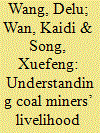

|
|
|
|
|
| Summary/Abstract |
Because of the significant declining in coal demand, the problem of miners' livelihood vulnerability is more and more serious. This study takes Ordos, the largest coal city in China, as its research area and uses the system dynamics method to construct a simulation model of miners' livelihood vulnerability. Further, the evolution of livelihood vulnerability in different scenarios is revealed and the effectiveness of different coping strategies is discussed. The results show a certain degree of volatility in miners' livelihood vulnerability in Ordos and a high overall level of vulnerability; compared with capacity reduction, the coal price slump has a greater negative impact on miners' livelihood. Second, there are clear differences in the overall and cumulative effects of different coping strategies. Compared with reducing enterprise tax rate and improving social security level, developing living service industry, enhancing financial service level, and improving the technology and education level have a more marked effect on reducing livelihood vulnerability; reducing enterprise tax rate can quickly reduce vulnerability, but its effectiveness is declining, while the cumulative effect of other strategies is increasing. Finally, strategies have different influence paths on miners’ livelihood, and that is the main reason for the difference in the effectiveness of strategies.
|
|
|
|
|
|
|
|
|
|
|
|
|
|
|
|
|
|
|
|
|